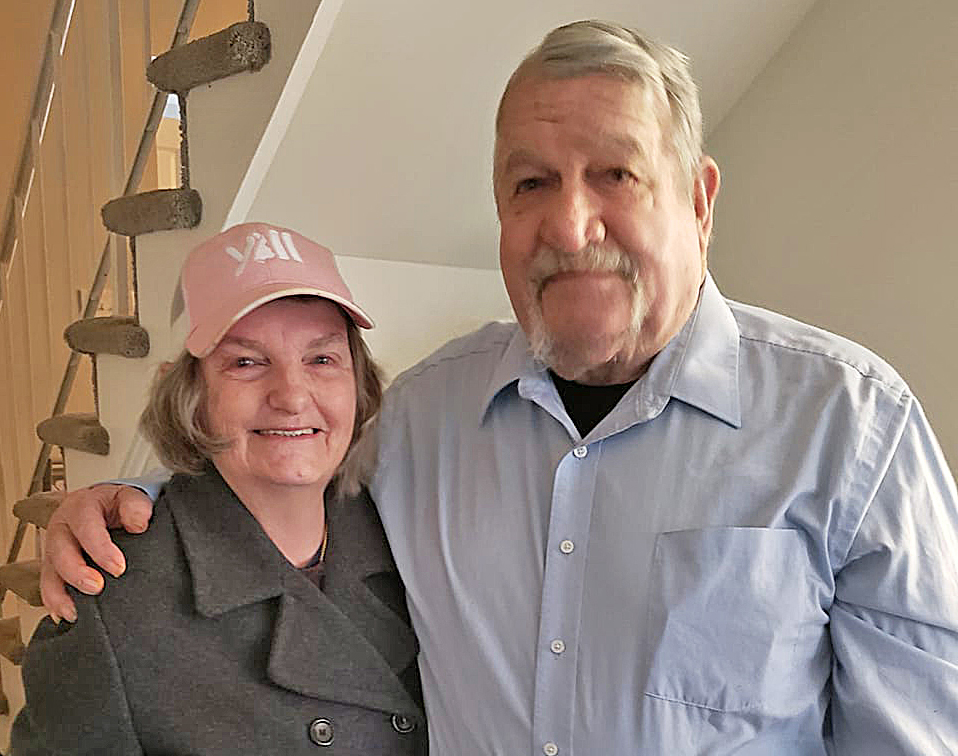Article by Gwen Jones, Department of Family Services
(Posted 2024 June)


June is Men’s Health Month, an annual recognition created to increase awareness of preventable health problems and encourage early detection and treatment of disease among men and boys. While it is important to guard against disease, circumstances in your life can also significantly impact your health and well-being, so it is important to be aware of resources available to help.
Increasingly, older men are taking on the role of caregiver for a loved one, often following a health emergency or diagnosis. This situation can take an enormous physical and/or mental toll on the caregiver.
Mike Keel, who is 80 years old, became a caregiver to his wife Susan when she was diagnosed with Alzheimer’s disease in 2011. Initially, he was able to cope as a full-time caregiver, crediting his family and Alzheimer’s caregiver support group for providing emotional support. However, the burden of caregiving eventually became too much, so Keel searched online for help. “As a caregiver, it gets to a point when you have to get help,” he shares.
He contacted the Adult and Aging Division of Fairfax County’s Department of Family Services and after finding out that they qualified for services, a social services specialist lined up a respite caregiver for Susan several times a week, giving Keel some much needed time for himself. After a decade of caring for Susan, her condition deteriorated, and it became unsafe for her to remain at home. She needed to live in a facility that could provide 24-hour care. Again, the social services specialist stepped up, providing Keel with assistance to determine his wife’s eligibility for Medicaid and helping him locate a facility nearby that could provide the appropriate level of care.
While Keel doesn’t believe that caregiving impacted him physically, he recalls that the emotional toll was terrible. “You just deal with it. You reach a point when you have no time for yourself. Everything you do revolves around taking care of them,” he shares. The experience of caring for Susan also resulted in Keel becoming socially isolated. “I used to do a lot of activities with friends. When Alzheimer’s comes along you lose those relationships because people keep going but you’re not,” he says.
Keel credits his religious faith and his Alzheimer’s caregiver support group with getting him through the most difficult times. Having navigated a difficult caregiving journey, he encourages other men to seek help, saying, “Don’t be embarrassed about your situation. Men are hesitant to reach out for help. You’re going to need help and you can’t do it by yourself. Take all the help you can get.” He also advises caregivers to learn as much as they can about their loved one’s condition and to contact the Adult and Aging Division of Fairfax County’s Department of Family Services to find out about available resources and get advice on caring for their loved one. Caregivers may also find some comfort in Keel’s advice, “You learn that this disease is not a problem you can solve. It’s a big change and it’s hard at first but it gets easier. Take it day by day.”
To learn more about Family Caregiver Support Programs available from the Department of Family Services Adult and Aging Division, visit FairfaxCounty.gov/familyservices/older-adults/family-caregiver-support-programs. You may also contact the Adult and Aging Division’s Aging, Disability and Caregiver Resources (ADCR) phone line to speak with a social services specialist Monday through Friday, 8 a.m.-4:30 p.m. by calling 703-324-7948.
This article is part of the Golden Gazette monthly newsletter which covers a variety of topics and community news concerning older adults and caregivers in Fairfax County. Are you new to the Golden Gazette? Don’t miss out on future newsletters! Subscribe to get the electronic or free printed version mailed to you. Have a suggestion for a topic? Share it in an email or call 703-324-GOLD (4653).

